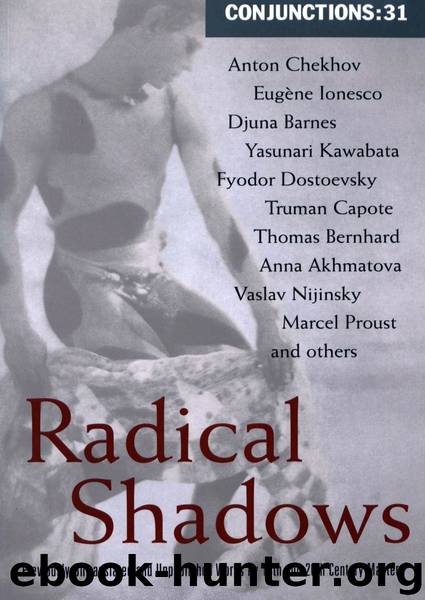Radical Shadows by Bradford Morrow

Author:Bradford Morrow [Morrow, Bradford]
Language: eng
Format: epub
ISBN: 978-1-4804-6388-2
Publisher: Conjunctions
AFTERWORD
The Instant of My Death
Maurice Blanchot
—Translated from French by Jeff Fort
TRANSLATOR’S NOTE
THE FOLLOWING WORK WAS published in French in 1994 and this is its first appearance in English. It is, more than any other narrative work by Blanchot, an autobiographical text. This is clear from its many concrete historical references: Blanchot writes of himself as a young man, of his family, of the large house that remains standing in Burgundy and of historical events of World War II. There is no reason to believe that the experience it relates did not actually occur. Blanchot himself attests to this in a letter (cited by its recipient, Jacques Derrida, in Demeure, 1998), which begins: “20 July [1994]. Fifty years ago I had the good fortune [le bonheur] of almost being shot to death.” The autobiographical dimension of the story is nevertheless far from straightforward. Blanchot even seems to have deliberately signaled this by including certain inaccurate dates among those that he mentions: 1807 instead of 1809 (the facade) and 1806 (Napoleon). (This is pointed out both by Derrida and by Blanchot’s biographer, Christophe Bident.) These slight displacements mark the way in which this text, like the moment of bonheur at its center, hovers uncannily between literature and history, fiction and testimony.
Blanchot’s career is marked by many shifts and ruptures, both political and aesthetic, involving the relation of writing to politics and history, and one of the most important of these occurred around the time at which this story takes place. Before the war, Blanchot wrote political essays for right-wing journals in which, from a nationalist and anti-German position, and with a shrill and incendiary style, he called for quick and radical solutions to France’s political problems. After the surrender of France in 1940, Blanchot, apparently disgusted and demoralized, turned away from any overtly political writing and concentrated on his novels and literary criticism, eventually withdrawing to the house depicted here. But this activity, too, was not without its compromises, for the critical writing appeared in a literary journal supported by the Vichy government and subject to German censorship, the Journal des débats, by whom Blanchot was paid for his work. (Some of these essays were collected in Faux Pas, published in 1943 by Gallimard.) At the same time, it is known that he had ties to the Resistance and helped transport Jews and others in danger across the border to Switzerland. (After the war, Blanchot’s political stance was decidedly leftist.) The following piece is heavily charged with many of the associations surrounding this complex wartime situation.
There are two significant translation problems worth pointing out. First, “Le pas au-delà,” which means both “the step beyond” and, by a play on words, “the not beyond,” is the title of one of Blanchot’s previous books. Second, the final words of the text read: “… l’instant de ma mort, desormais toujours en instance.” The phrase en instance carries a range of meanings which no English expression can cover. By itself, instance can mean “the site of
Download
This site does not store any files on its server. We only index and link to content provided by other sites. Please contact the content providers to delete copyright contents if any and email us, we'll remove relevant links or contents immediately.
Beautiful Disaster by McGuire Jamie(24371)
Trainspotting by Irvine Welsh(20044)
Call Me by Your Name by André Aciman(18953)
The Secret History by Donna Tartt(16608)
Cat's cradle by Kurt Vonnegut(13856)
Pimp by Iceberg Slim(12923)
All the Missing Girls by Megan Miranda(12739)
The Tidewater Tales by John Barth(12026)
Norse Mythology by Gaiman Neil(11874)
4 3 2 1: A Novel by Paul Auster(11034)
Scorched Eggs by Childs Laura(10801)
The Break by Marian Keyes(8599)
Adultolescence by Gabbie Hanna(8137)
All the Light We Cannot See: A Novel by Anthony Doerr(7818)
Where the Crawdads Sing by Delia Owens(7745)
A Man Called Ove: A Novel by Fredrik Backman(7663)
The remains of the day by Kazuo Ishiguro(7542)
Memorizing You by Dan Skinner(7409)
(2T) A Bone to Pick by Harris Charlaine(7306)
